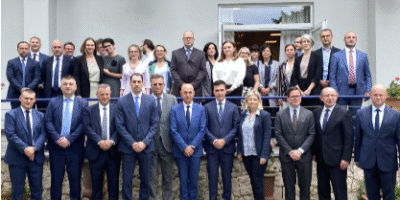May 11 did not merely deliver an electoral setback to Sali Berisha—it marked a profound turning point in Albania’s opposition politics. Far beyond a routine local election, it became a litmus test for Berisha’s contested leadership over the Albanian opposition, and the results delivered a clear message: a significant portion of the opposition’s electorate has decisively turned the page.
In the aftermath of the vote, Berisha labelled the process a “farce,” distancing himself from the statutory obligation that binds party leaders to resign after election losses. The terminology—swapping “election” for “farce”—is not just semantic evasion; it is a calculated attempt to shield himself from the political consequences that any other democratic leader would be forced to confront. But even his rhetoric cannot mask the political reality: despite having rallied key figures from the Democratic Party (PD), Berisha failed to win over the broader opposition base. His leadership, which once commanded mass support, has been eroded by deep internal divisions and by a failure to present a compelling democratic alternative.
This internal fracture has since become more pronounced. On one side are opposition actors acknowledging the defeat and calling for internal reform; on the other stands Berisha and his inner circle, clinging to denial and conspiracy to maintain relevance. The refusal to accept defeat is not a strategy of resilience—it is a symptom of political exhaustion. Moreover, the recount of votes—which, as Berisha himself admitted, was requested by opposition candidates and not PD as a party—has not revealed systematic manipulation. In fact, the minor irregularities uncovered often favored PD, undercutting the claim that the electoral process was inherently flawed. This weakens Berisha’s central argument that “the vote died before it reached the box.”
Meanwhile, Berisha’s efforts to internationalize the issue—through video clips and statements at international forums like the Council of Europe—appear increasingly self-serving. These campaigns, framed as calls to protect democracy, are more transparently aimed at protecting his political legacy and legal standing, as he remains designated “non grata” by the United States and the United Kingdom due to major corruption allegations. His talk of an “all-out battle” and promises of further civil disobedience are not calls for democratic renewal—they are signs of a political agenda with no viable strategy, fueled by grievance and personal vulnerability. Berisha’s narrative that there can be no real opposition without restoring the “free vote” is politically ironic, given that he himself has been a symbol of institutional capture and electoral abuse during his time as president and prime minister.
The division within Albania’s opposition is now clear and widening. The faction that acknowledges defeat is gradually growing, even within Berisha’s own party. With every passing day, his monopoly over the opposition appears more historical than current. For international observers and key actors in Albania’s Euro-Atlantic path, the message is now evident: Sali Berisha is no longer the sole voice of the opposition, but rather one of several—arguably, the most polarizing.
The beginning of the new parliamentary session is likely to widen this rift further. With the Socialist Party enjoying a solid majority, Berisha’s influence—even as an oppositional figure—is expected to decline further. Future parliamentary compositions and reforms, including electoral reform demanded by the EU, are being shaped without the need for his participation. The PD under his leadership is increasingly viewed as an obstruction to reform, not a partner in it. Thus, May 11 did not merely bring another failed electoral campaign for Berisha. It stripped him of his last major claim to legitimacy—the notion that he spoke for the Albanian opposition. He may still raise his voice, but Albania’s opposition, and perhaps Albania itself, is beginning to look beyond him.
Written by our correspondent A.T.



